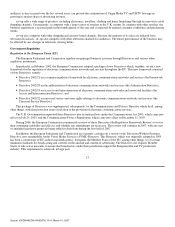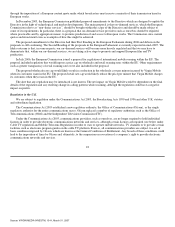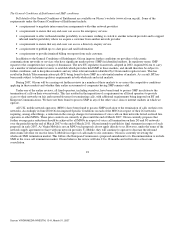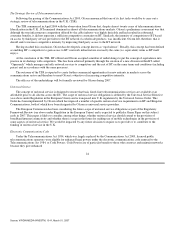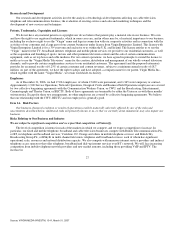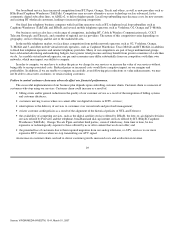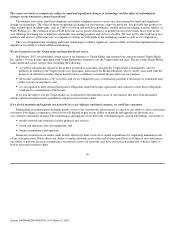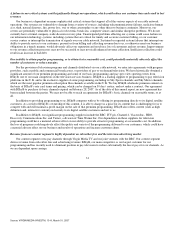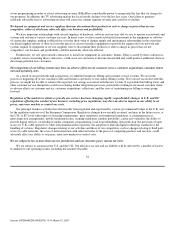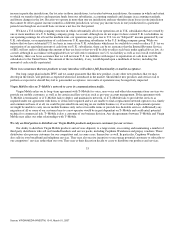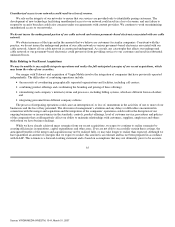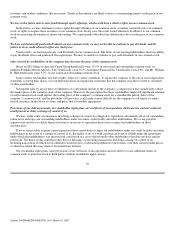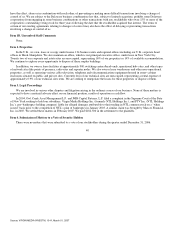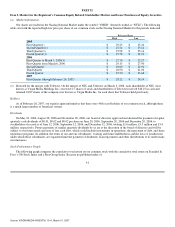Virgin Media 2006 Annual Report Download - page 35
Download and view the complete annual report
Please find page 35 of the 2006 Virgin Media annual report below. You can navigate through the pages in the report by either clicking on the pages listed below, or by using the keyword search tool below to find specific information within the annual report.
A failure in our critical systems could significantly disrupt our operations, which could reduce our customer base and result in lost
revenues.
Our business is dependent on many sophisticated critical systems that support all of the various aspects of our cable network
operations. Our systems are vulnerable to damage from a variety of sources, including telecommunications failures, malicious human
acts, theft, natural disasters, fire, power loss, war or other catastrophes or any other threat to business continuity. Moreover, our
servers are potentially vulnerable to physical or electronic break−ins, computer viruses and similar disruptive problems. We do not
currently have a formal company−wide disaster recovery plan. Unanticipated problems affecting our systems could cause failures in
our information technology systems, including systems that are critical for timely and accurate customer billing, or our customer
service centers or interrupt the transmission of signals over our cable network. Sustained or repeated system failures that interrupt our
ability to provide service to our customers, prevent us from billing and collecting revenue due to us, or otherwise meet our business
obligations in a timely manner, would adversely affect our reputation and result in a loss of customers and net revenue. Improvements
to our revenue collection processes may not be successful or may not yield enhanced revenue collection. Inefficient collection could
result in an increase in bad debt.
Our inability to obtain popular programming, or to obtain it at a reasonable cost, could potentially materially adversely affect the
number of customers or reduce margins.
For the provision of television programs and channels distributed via our cable network, we enter into agreements with program
providers, such as public and commercial broadcasters, or providers of pay or on demand television. We have historically obtained a
significant amount of our premium programming and some of our basic programming and pay−per−view sporting events from
BSkyB, one of our main competitors in the television services business. BSkyB is a leading supplier of programming to pay television
platforms in the U.K. and is the exclusive supplier of some programming, including its Sky Sports channels and Sky Movie channels,
which are the most popular premium subscription film channels available in the U.K. We buy BSkyB wholesale premium content on
the basis of BSkyB’s rate card terms and pricing, which can be changed on 30 days’ notice, and not under a contract. Our agreement
with BSkyB to purchase its basic channels expired on February 28, 2007. As of the date of this annual report, no new agreement has
been reached between the parties. We may not be able to reach an agreement for BSkyB’s basic channels on reasonable terms, or at
all.
In addition to providing programming to us, BSkyB competes with us by offering its programming directly to its digital satellite
customers. As a result of BSkyB’s ownership of this content, it is able to charge us a price for its content that is challenging for us to
compete with and still maintain a profit margin on the sale of that premium programming. BSkyB also offers content (such as high
definition and, interactive content) exclusively to its digital satellite customers and not to us.
In addition to BSkyB, our significant programming suppliers include the BBC, ITV plc, Channel 4, Viacom Inc., HBO,
Discovery Communications Inc. and Turner, a division of Time Warner Inc. Our dependence on these suppliers for television
programming could have a material adverse effect on our ability to provide attractive programming at a reasonable cost. In addition,
the loss of programs could negatively affect the quality and variety of the programming delivered to our customers, which could have
a material adverse effect on our business and results of operations and increase customer churn.
Revenue from our content segment is highly dependent on subscriber fees and the television advertising market.
Our content segment owns pay channels through Virgin Media TV and our joint ventures with the BBC. Our content segment
derives revenue from subscriber fees and advertising revenue. BSkyB, our main competitor, is our largest customer for our
programming and has recently used its dominant position in pay television to reduce substantially the fees it pays for our channels. As
we are dependent upon carriage
31
Source: VIRGIN MEDIA INVESTM, 10−K, March 01, 2007


